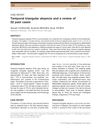 56 citations,
November 2010 in “Pigment Cell & Melanoma Research”
56 citations,
November 2010 in “Pigment Cell & Melanoma Research” Brain hormones significantly affect hair color and could potentially be used to prevent or reverse grey hair.
 56 citations,
July 2008 in “European journal of endocrinology”
56 citations,
July 2008 in “European journal of endocrinology” Metformin and rosiglitazone improve blood vessel function in women with PCOS, with metformin also reducing insulin resistance and testosterone levels.
 56 citations,
April 2007 in “Journal der Deutschen Dermatologischen Gesellschaft”
56 citations,
April 2007 in “Journal der Deutschen Dermatologischen Gesellschaft” Minoxidil works better for female hair loss than alfatradiol, both safe.
 56 citations,
February 2006 in “American journal of physiology. Cell physiology”
56 citations,
February 2006 in “American journal of physiology. Cell physiology” Steroid sex hormones activate matriptase in prostate cancer cells but not in breast cancer cells.
 56 citations,
April 2003 in “Fertility and Sterility”
56 citations,
April 2003 in “Fertility and Sterility” All three treatments reduce hirsutism, but spironolactone works best long-term.
 56 citations,
October 1983 in “Archives of Dermatology”
56 citations,
October 1983 in “Archives of Dermatology” Some women with acne have higher levels of free testosterone, which might suggest using hormonal treatments for acne.
 56 citations,
September 2013 in “Journal of Biochemistry and Molecular Biology”
56 citations,
September 2013 in “Journal of Biochemistry and Molecular Biology” Androgens increase a growth factor in hair cells by creating reactive oxygen species, and antioxidants might help treat hair loss.
 56 citations,
February 2012 in “Cell Cycle”
56 citations,
February 2012 in “Cell Cycle” MicroRNAs are crucial for controlling skin development and healing by regulating genes.
 56 citations,
March 2010 in “Journal of Dermatology”
56 citations,
March 2010 in “Journal of Dermatology” Most cases of Temporal Triangular Alopecia are found in early childhood and may be related to genetic conditions.
 56 citations,
April 1998 in “Steroids”
56 citations,
April 1998 in “Steroids” Finasteride reduces hair loss and treats BPH without major hormone changes, but may cause sexual dysfunction.










